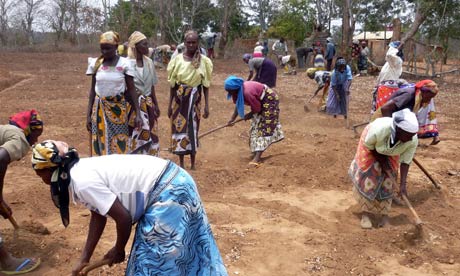That smallholder farmers are on the agenda is gratifying for Kanayo Nwanze, president of the International Fund for Agricultural Development (Ifad), one of the three UN food agencies based in Rome. The Nigerian national, who has worked for 30 years in poverty reduction through agriculture, rural development and research, will be championing the cause of smallholder farmers in Rio next week.
Nwanze said smallholder farmers have gained tremendous importance in the past five years, beginning with the L'Aquila initiative in 2009, in which the G8 industrialised countries pledged to invest $22bn in agriculture in the developing world to boost food security.
"It has been fascinating to see the importance given to small farmers now compared with 20 years ago, when they were considered not sustainable because of their slash and burn techniques," Nwanze said in a telephone interview from Rome. "Now they are considered among the most sustainable private-sector enterprises in terms of family inputs and their relation to the land. Smallholder farmers were specifically mentioned by President Obama at Camp David last month [in the G8 food security initiative]."
Nwanze, who will be chairing a corporate sustainability forum in Rio, said he was looking for two things from the summit. First, he wants agriculture to remain pivotal in any agreement coming out from negotiations.
"There is not a trade-off between agriculture and the environment," he said. "It's both. It comes down to sustainable intensified systems and the engagement of small farmers. Secondly, governments have to take leadership and champion change, bring agriculture to the fore and the centrality of small farmers and 'climate smart' agriculture."
By climate smart agriculture, Ifad means the use of techniques that take into account climate change, extreme conditions of drought and flooding. Such techniques already exist, from terracing to prevent soil loss through erosion and flooding, minimum or zero tillage, coupled with crop rotation and the application of manure, compost or mulching. Agroforestry is also cited as a way of building up resilience, combining trees with agricultural crops or livestock, where trees improve soil quality by capturing nutrients from deep in the soil, as well as acting as a bulwark against erosion.
Ifad's rural poverty report 2011 said that, since the 1980s, new agroforestry systems have been built by farmers on 5 million hectares (12 million acres) in Niger's Maradi and Zinder regions, helping to produce more than 500,000 additional tonnes of food annually.
As Nwanze explained, the green revolution in the 1970s resulted in spectacular achievements. India, for example, increased its rice production between 1970 and 2008 from 63m to 148m tonnes and its wheat production nearly quadrupled from 20m to 78m tonnes. But the intensive use of inputs – pesticides and fertilisers – was not sustainable, hence a return to local innovations and the knowledge and seed varieties.
But as Olivier De Schutter, the UN's special rapporteur on the right to food, has argued, it is unrealistic to seek sustainable progress in combating rural poverty simply through technology. Just as important are what he calls the political economy of food systems and the question of bargaining power. He points out that small-scale farmers are often not organised enough to have a strong bargaining position in the food chain. They buy their inputs at retail prices and sell their crops at wholesale prices, because they cannot negotiate fair prices. De Schutter argues that farmers must be encouraged to form co-operatives and unions, and governments encouraged to involve such organisations in the design and implementation of public policies.
Nwanze certainly sees eye to eye with De Schutter on the question of collective power of smallholder farmers, although they probably part company on the use of technology and the role of the private sector (De Schutter is more sceptical of the private-sector role).
"The best way to create the conditions for poor farmers to grow their businesses is to support and work with their organisations," Nwanze said in a speech to the World Farmers' Organisation last week. "This is why farmers' organisations are Ifad's business partners in almost every country where we operate."
Nwanze cited examples of where Ifad has helped smallholders to organise themselves, including a project in Egypt, where farmers supply fresh oranges and mozzarella cheese to resorts in Sharm-el-Sheikh, and export sweet peppers and sun-dried tomatoes to Italy and the US. Most impressively, the farmers' associations have a contract with Heinz, the food giant, which buys 6,000 tonnes of tomatoes a year from 300 project farms.
The world's 500m smallholder farms provide up to 80% of food in developing countries so their significance should not be overlooked at Rio. Vietnam provides a telling example of how small farmers can prove a potent force for development. It has gone from being a food-deficit country to a major food exporter, and is now the second largest rice exporter in the world, largely through development of its smallholder farming sector. In 2007, the poverty rate fell below 15% compared with 58% in 1979. That is the kind of record Nwanze would like to see replicated in Africa.

